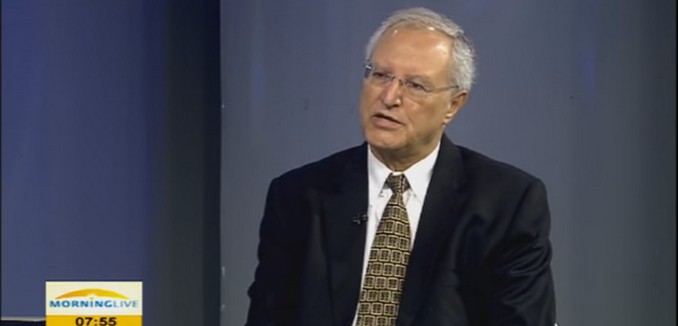Palestinians must seek normalization with Israel in order to achieve independence, a Palestinian professor who has been ostracized in his community for arranging trips to Auschwitz said in an interview on Tuesday.
Mohammed S. Dajani was targeted by the Palestinian anti-normalization movement for his efforts to achieve mutual understanding—he was denounced as a “traitor” by his fellow professors at al-Quds University in Jerusalem and his car was set on fire.
The failure of the movement, Dajani said in an interview with the Washington Institute for Near East Policy, is that “it fails to see that the Palestinian cause must be won inside of Israel and that normalization is an essential step in the process to end the conflict.” By ostracizing Israel, Palestinians threaten to alienate the Israeli people from the “cause of peace,” making peace “improbable, if not impossible.” He also noted that the anti-normalization campaign violates the terms of the Oslo Accords because it “called for the end of incitement and encourages the process of normalization….Anti-normalization undermines the peace process, blocking the possibility of reconciliation and conflict resolution.”
Dajani pointed out that he has not been alone in being targeted by anti-normalization activists. Earlier this year, when an Israeli leftist group traveled to the West Bank to celebrate an Iftar meal during Ramadan, they had stones thrown at them and their car was torched. “These intimidation tactics aim to shut down interpersonal reconciliation, weakening Palestinian civil society and NGOs,” Dajani said.
Dajani blamed the anti-normalization campaign on both Fatah and Hamas, who “weaken the role of civil society organizations in order to remain in control of the political agenda” and become the exclusive representatives of the Palestinians.
Contrary to the claims of the anti-normalization movement that their actions are necessary to bring an end to to the occupation, engaging with Israelis would create a “trusting environment that would usher in a new era of reconciliation and peace through a negotiated peaceful settlement,” Dajani said.
Dajani commended a number of organizations, including Wasatia, which he founded, for bringing “Israelis and Palestinians together in school, agricultural, high-tech and advocacy programs, or camps.” The relationships formed through the work these organizations “construct bridges of understanding between Palestinians and Israelis to advance the causes of moderation, reconciliation, peace, and coexistence.”
“Without cooperation, without communication and normalization,” Dajani concluded, “peace is impossible. And that’s precisely our goal.”
Dajani was the subject of a profile this week in Haaretz, in which he explained how he developed his interest in the Holocaust:
The first time I heard about the Holocaust was at the American University in Beirut, and that, written in Arabic, was the denial narrative. My encounter with the term ‘Holocaust’ was that it didn’t happen or was part of the atrocities of World War II, but not something that was uniquely Jewish or aimed at the annihilation of the Jews. Eventually, I coauthored a book about the Holocaust in Arabic, because I couldn’t find a text that documented it in terms of what really happened. We felt we had to fill that gap.”
Also this week, Khaled Abu Toameh profiled Sheikh Abdullah Tamimi, a member of a prominent Hebron clan who also promotes dialogue between Palestinians and Israelis. Tamimi has also been ostracized for his efforts. “We need to sit together and understand each other,” Tamimi said. “This will help the leaders make decisions. We want both peoples to live a dignified life.”
Abu Toameh reported that Tamimi “represents an increasing number of Palestinians who have lost confidence in their leaders’ ability to improve their living conditions and achieve peace and stability in the region.” To Abu Toameh, Tamimi and those like him are seeking to feel a “vacuum” left by Palestinians leadership, which has “once again failed their people” by postponing upcoming local elections. “Who will triumph,” he asked, “Palestinians and their Jewish neighbors in the West Bank who wish to live in peace, or the anti-Palestinian, anti-Israel, ‘anti-normalization’ activists who seek to derail a true peace at any cost?”
[Photo: SABC Digital News / YouTube ]




